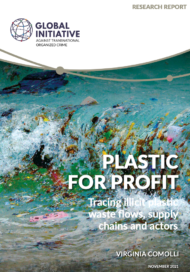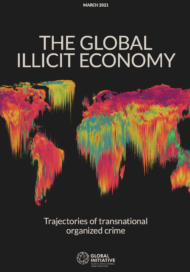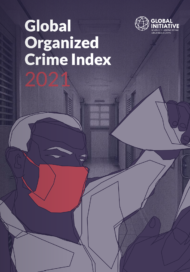Posted on 31 Oct 2021
The United Kingdom is currently hosting the 26th UN Climate Change Conference of the Parties (COP26) in Glasgow. As heads of state convene to make new commitments to address the climate crisis and draw attention to the need for dramatic action, it is important that they consider the relationship between organized crime and climate change, and the need to develop responses that tackle this nexus in a sustainable manner.
If you look at illicit markets through the lens of climate justice and climate action, you see the need for responses to such markets that address environmental harms, protect people’s rights and livelihoods, and reduce organized criminal capture of markets and commodities. This will help foster sustainable practices that over the long term reduce vulnerabilities to both criminal capture and climate change.
The relationship between criminal economies and the environment – and by extension, climate change – is one in which environmental exploitation by criminal groups causes environmental degradation and resource scarcity. For instance, nearly half of all tropical deforestation is caused by illegal logging to convert land for agriculture use. Such destructive practices contribute to climate change and its impacts, such as extreme weather, drought, increasing resource scarcity and population movement. As these impacts put pressure on local economies and communities, they generate instability and opportunities for new illicit markets, such as monopolized water distribution by so-called water mafias. Although severe weather is now impacting all corners of the globe, the greatest risks are concentrated in regions where political and social marginalization and vulnerability are already fundamental problems.
The cycle of damage and instability is a double hit for countries in the Global South, home to many illicit natural resource and wildlife markets. The burden in supplying illegal wildlife and non-renewable natural resource markets falls disproportionately on equatorial and tropical countries, which have the highest concentrations of biodiversity and many sought-after minerals. The tech boom of the late 1990s significantly increased demand for rare earth and precious metals, and many of these supply chains are in Global South regions where the resources are controlled, traded and taxed by non-state armed groups or corrupt officials. By 2016, FARC, the Colombian left-wing guerrilla group, for example, was estimated to generate 20% of its funding from illegal gold mining. An increasing number of armed groups have taken on mining, leading to increased deforestation and rights violations in regions such as the Amazon.
The transition to clean energy will not be without risks of generating new criminal activity that causes further environmental and social harms. For instance, electric vehicles rely on lithium and cobalt for their batteries. In cobalt mines in the Democratic Republic of Congo, holding 50 per cent of the world’s cobalt, an estimated 40 000 children work in mines in unsafe conditions, as reported by UNICEF. In 2019, Apple, Google, Dell, Microsoft and Tesla were all named in a lawsuit seeking damages for children who were killed or injured while mining for cobalt. Yet at the same time, informal miners can find themselves criminalized by laws preventing artisanal mining or by land concessions that make areas off limits. A significant ramp-up in production without considering these complex relationships may generate new problems and need to be accounted for.
Climate-related issues like resource scarcity, when coupled with lack of government solutions, create conditions for the co-optation of basic-needs markets by criminal groups. Increased water scarcity has been experienced in all regions of the world, with reservoirs and rivers drying up from drought, or rapid urbanization occurring without proper infrastructure provision. For instance, there is no running water in the informal settlement of Kibera in Nairobi, Kenya, where residents pay water cartels 50 times more for water supply than residents pay in the city’s affluent areas. In Karachi, Pakistan, armed gangs steal water from illegal water stations to sell on the black market at an inflated rate, mostly to big business.
Countries in the Global South are also recipients of hazardous materials such as e-waste, generated mostly by Western nations, through illegal dumping supply chains. Millions of tonnes of hazardous e-waste from Europe and the US are illegally exported to countries such as Ghana, Nigeria, Pakistan, India and Brazil. In this lucrative illicit industry, organized criminal groups have created legal recycling, scrap and waste-disposal firms that claim to dispose of the West’s e-waste in a legal manner, but which in reality fraudulently export the waste as ‘reusable’ or ‘second-hand’ to developing countries, where it is destroyed in dangerous conditions. The GI-TOC will publish in November a special report on illicit transnational flows of plastic waste.
A package of responses that address communities, conservation and targeted law enforcement actions, among others, is needed. Longer-term, more impactful law enforcement should be sought by targeting the higher management levels of criminal syndicates and through cross-border collaboration to disrupt networks along transnational illicit supply chains.
At the source, international assistance should look more closely at incentives and approaches that improve local community engagement with policymaking. Donor funding and technical support should be at a grass-roots level in key places, such as those where environmental crime occurs, or where local communities exploit the environment in an unsustainable and damaging way. This needs to be an alternative response to criminalizing communities, such as those engaged in wildlife poaching, the charcoal trade or artisanal gold mining. These efforts should both strengthen local government while improving its accountability to the local population and environment. And such interventions should form an essential part of state efforts and commitments as world leaders head into COP26.
For readers interested in understanding more about the environment–organized crime link, see here. The GI-TOC has published extensively on environmental organized crime economies, including online illegal trade in wildlife and endangered flora, non-renewable natural resource economies, and illegal, unreported and unregulated fishing.



